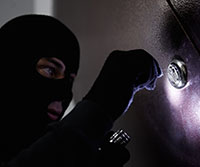The number one victim of counterfeiting is you, because by buying a counterfeit product:
- you’re putting your health and safety at risk
- you’re financing organised crime
- you’re supporting clandestine and child labour
- you’re accepting the plundering of recognised know-how
- you’re destroying jobs and stifling growth
- and above all, you’re exposing yourself to criminal sanctions

Buying counterfeit products means putting your health and safety at risk
Counterfeiters pay no heed to safety standards or the materials they use, and even less to your health and safety. Profit is their sole concern. Most of the time, counterfeit watches are produced using poorer quality and sometimes potentially harmful materials (allergenic, toxic, etc).

Buying counterfeit products means supporting and financing organised crime
You don’t tolerate theft or drugs? The truth is that counterfeit products are sold through the same criminal channels. The links between counterfeiting and criminal networks have been demonstrated time and again, because counterfeiting often relies on the same infrastructures and transport networks as other illegal activities, such as drug and weapons trafficking, contraband, prostitution, etc.

Buying counterfeit products means supporting clandestine and child labour
The people who are exploited in the manufacture of counterfeit products, including large numbers of children, work under very difficult conditions, are paid derisory wages, and clearly do not benefit from any legal, social or medical safeguards.

Buying counterfeit products means accepting the plundering of recognised know-how
Counterfeiters appropriate the renown of third parties and profit unfairly from investments made by the holders of intellectual property rights. The protection of intellectual property is justified not only morally (designs must be acknowledged and protected) but also economically (investments and risk-taking must be rewarded). Intellectual property therefore contributes to development and progress.

Buying counterfeit products means destroying jobs and stifling growth
Counterfeiting directly affects legitimate distribution networks, which are often unable to cope with this unfair competition. As the number of bankruptcies rises, more jobs are lost. Counterfeiting contributes every year to the loss of more than 200,000 jobs worldwide, 100,000 in Europe alone. For governments this represents fiscal losses, i.e. public money which cannot be reinvested.

Buying counterfeit products means exposing yourself to criminal sanctions
Buying a counterfeit product is not a harmless act. As the buyer, you are running the risk of criminal, civil and customs sanctions. In many countries, the simple possession of counterfeit goods is considered an offence. In addition, damages can be claimed by the legitimate holders of intellectual property rights. Customs are also authorised to seize and destroy illegal products and hand out large fines.


 Stop the fakes!
Stop the fakes!